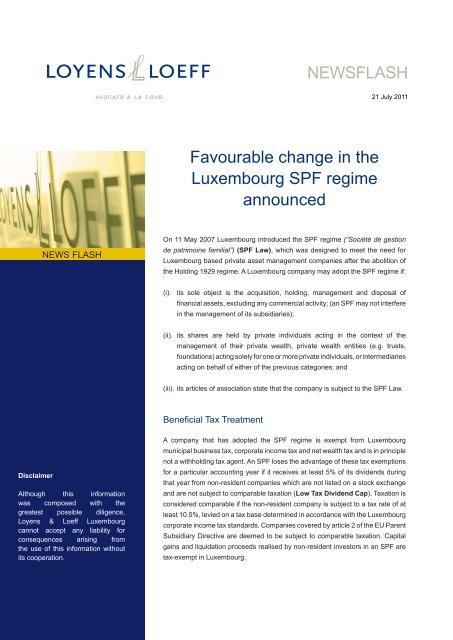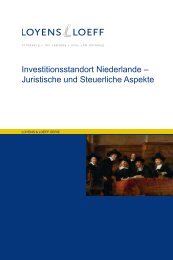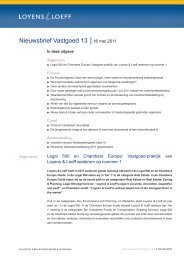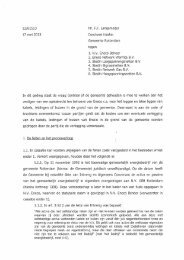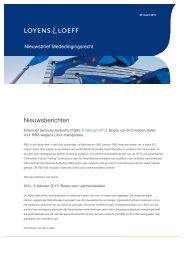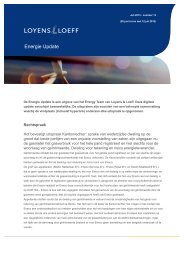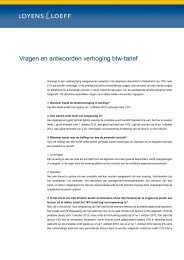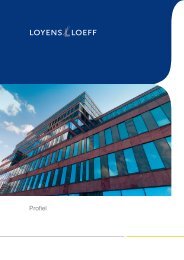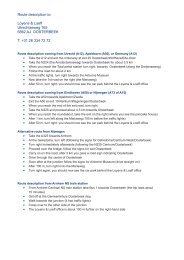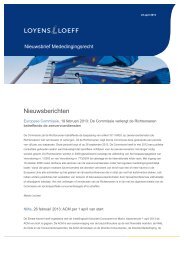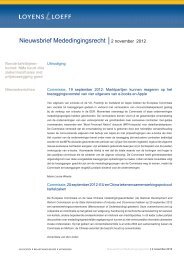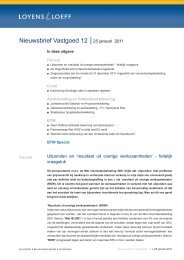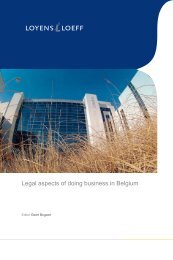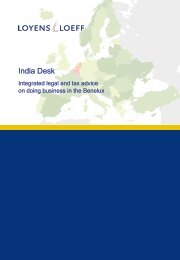Favourable change in the Luxembourg SPF regime ... - Loyens & Loeff
Favourable change in the Luxembourg SPF regime ... - Loyens & Loeff
Favourable change in the Luxembourg SPF regime ... - Loyens & Loeff
Create successful ePaper yourself
Turn your PDF publications into a flip-book with our unique Google optimized e-Paper software.
Disclaimer<br />
NEWS FLASH<br />
Although this <strong>in</strong>formation<br />
was composed with <strong>the</strong><br />
greatest possible diligence,<br />
<strong>Loyens</strong> & <strong>Loeff</strong> <strong>Luxembourg</strong><br />
cannot accept any liability for<br />
consequences aris<strong>in</strong>g from<br />
<strong>the</strong> use of this <strong>in</strong>formation without<br />
its cooperation.<br />
<strong>Favourable</strong> <strong>change</strong> <strong>in</strong> <strong>the</strong><br />
<strong>Luxembourg</strong> <strong>SPF</strong> <strong>regime</strong><br />
announced<br />
On 11 May 2007 <strong>Luxembourg</strong> <strong>in</strong>troduced <strong>the</strong> <strong>SPF</strong> <strong>regime</strong> (“Société de gestion<br />
de patrimo<strong>in</strong>e familial”) (<strong>SPF</strong> Law), which was designed to meet <strong>the</strong> need for<br />
<strong>Luxembourg</strong> based private asset management companies after <strong>the</strong> abolition of<br />
<strong>the</strong> Hold<strong>in</strong>g 1929 <strong>regime</strong>. A <strong>Luxembourg</strong> company may adopt <strong>the</strong> <strong>SPF</strong> <strong>regime</strong> if:<br />
(i). its sole object is <strong>the</strong> acquisition, hold<strong>in</strong>g, management and disposal of<br />
f<strong>in</strong>ancial assets, exclud<strong>in</strong>g any commercial activity; (an <strong>SPF</strong> may not <strong>in</strong>terfere<br />
<strong>in</strong> <strong>the</strong> management of its subsidiaries);<br />
(ii). its shares are held by private <strong>in</strong>dividuals act<strong>in</strong>g <strong>in</strong> <strong>the</strong> context of <strong>the</strong><br />
management of <strong>the</strong>ir private wealth, private wealth entities (e.g. trusts,<br />
foundations) act<strong>in</strong>g solely for one or more private <strong>in</strong>dividuals, or <strong>in</strong>termediaries<br />
act<strong>in</strong>g on behalf of ei<strong>the</strong>r of <strong>the</strong> previous categories; and<br />
(iii). its articles of association state that <strong>the</strong> company is subject to <strong>the</strong> <strong>SPF</strong> Law.<br />
Beneficial Tax Treatment<br />
A company that has adopted <strong>the</strong> <strong>SPF</strong> <strong>regime</strong> is exempt from <strong>Luxembourg</strong><br />
municipal bus<strong>in</strong>ess tax, corporate <strong>in</strong>come tax and net wealth tax and is <strong>in</strong> pr<strong>in</strong>ciple<br />
not a withhold<strong>in</strong>g tax agent. An <strong>SPF</strong> loses <strong>the</strong> advantage of <strong>the</strong>se tax exemptions<br />
for a particular account<strong>in</strong>g year if it receives at least 5% of its dividends dur<strong>in</strong>g<br />
that year from non-resident companies which are not listed on a stock ex<strong>change</strong><br />
and are not subject to comparable taxation (Low Tax Dividend Cap). Taxation is<br />
considered comparable if <strong>the</strong> non-resident company is subject to a tax rate of at<br />
least 10.5%, levied on a tax base determ<strong>in</strong>ed <strong>in</strong> accordance with <strong>the</strong> <strong>Luxembourg</strong><br />
corporate <strong>in</strong>come tax standards. Companies covered by article 2 of <strong>the</strong> EU Parent<br />
Subsidiary Directive are deemed to be subject to comparable taxation. Capital<br />
ga<strong>in</strong>s and liquidation proceeds realised by non-resident <strong>in</strong>vestors <strong>in</strong> an <strong>SPF</strong> are<br />
tax-exempt <strong>in</strong> <strong>Luxembourg</strong>.<br />
NEWSFLASH<br />
21 July 2011
NEWSFLASH • 21 July 2011 2<br />
An <strong>SPF</strong> is only subject to an annual subscription tax of 0.25% levied quarterly on its share capital, plus premium, plus<br />
outstand<strong>in</strong>g debt, <strong>in</strong>sofar as that debt is over eight times <strong>the</strong> sum of its share capital and share premium. The m<strong>in</strong>imum<br />
amount of <strong>the</strong> subscription tax per year is EUR 100, and <strong>the</strong> maximum amount is EUR 125,000. Due to its tax-exempt<br />
status an <strong>SPF</strong> is excluded from double tax treaty benefits and cannot benefit from <strong>the</strong> EU Parent Subsidiary Directive.<br />
Abolition of <strong>the</strong> Low Taxed Dividend Cap<br />
On 15 July 2011 <strong>the</strong> <strong>Luxembourg</strong> Government sent <strong>the</strong> Lower House (“Chambre des Députés”) a draft law which<br />
proposes <strong>the</strong> abolition of <strong>the</strong> Low Tax Dividend Cap. The draft law has been prepared as a direct result of a letter sent<br />
by <strong>the</strong> European Commission to <strong>the</strong> <strong>Luxembourg</strong> authorities on 9 February 2010, <strong>in</strong> which <strong>the</strong> European Commission<br />
argued that <strong>the</strong> Low Tax Dividend Cap <strong>in</strong>fr<strong>in</strong>ges <strong>the</strong> freedoms as laid down <strong>in</strong> <strong>the</strong> Treaty on <strong>the</strong> Function<strong>in</strong>g of <strong>the</strong><br />
European Union and <strong>the</strong> Agreement on <strong>the</strong> European Economic Area.<br />
If <strong>the</strong> draft law is approved, <strong>the</strong> <strong>SPF</strong> <strong>regime</strong> will become even more attractive than it currently is, as it will allow an <strong>SPF</strong> to<br />
receive dividends from entities <strong>in</strong> low tax jurisdictions, without any limitation and without jeopardis<strong>in</strong>g its tax exemptions<br />
for <strong>the</strong> relevant year.<br />
AMSTERDAM • ARNHEM • BRUSSELS • EINDHOVEN • LUXEMBOURG • ROTTERDAM • ARUBA<br />
CURAÇAO • DUBAI • FRANKFURT • GENEVA • LONDON • NEW YORK • PARIS • SINGAPORE • TOKYO • ZURICH
NEWSFLASH • 21 July 2011 3<br />
For fur<strong>the</strong>r <strong>in</strong>formation, please contact your regular tax counsel at <strong>Loyens</strong> & <strong>Loeff</strong> <strong>Luxembourg</strong> or:<br />
Pieter Stalman<br />
tel: +352 466 230 403<br />
pieter.stalman@loyensloeff.com<br />
Marie-Aleth Hendessy<br />
tel: +352 466 230 441<br />
marie-aleth.hendessy@@loyensloeff.com<br />
<strong>Loyens</strong> & <strong>Loeff</strong> <strong>Luxembourg</strong><br />
18-20, rue Edward Steichen<br />
L-2540 <strong>Luxembourg</strong><br />
tel: +352 466 230<br />
fax: +352 466 234<br />
www.loyensloeff.lu<br />
<strong>Loyens</strong> & <strong>Loeff</strong> <strong>Luxembourg</strong> comprises more than 110 professionals and offers corporate and tax services on<br />
a fully <strong>in</strong>tegrated basis.<br />
The <strong>Luxembourg</strong> office is affiliated with <strong>Loyens</strong> & <strong>Loeff</strong>, which has over 900 professionals <strong>in</strong> 17 offices <strong>in</strong> <strong>the</strong><br />
Benelux and <strong>the</strong> ma<strong>in</strong> f<strong>in</strong>ancial centres of <strong>the</strong> world.<br />
Frank van Kuijk<br />
tel: +44 20 782 630 79<br />
frank.van.kuijk@loyensloeff.com<br />
AMSTERDAM • ARNHEM • BRUSSELS • EINDHOVEN • LUXEMBOURG • ROTTERDAM • ARUBA<br />
CURAÇAO • DUBAI • FRANKFURT • GENEVA • LONDON • NEW YORK • PARIS • SINGAPORE • TOKYO • ZURICH


